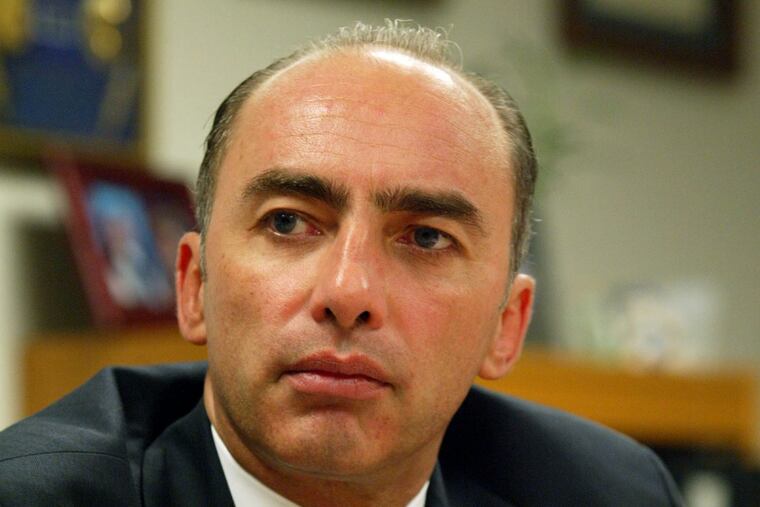Philadelphia Parking Authority honcho Richard Dickson set to snag record $655K retirement perk
Richard Dickson, a deputy executive director at the Philadelphia Parking Authority, is set to collect a $655,000 payment in 2021 through the city's controversial DROP program. It is expected to set a new record.

City Council reformed the controversial retirement perk known as DROP in 2011, but a top Philadelphia Parking Authority official is set to collect a lump-sum payment of $655,000 — a new record for the program.
Richard Dickson, a deputy executive director at the PPA, filed an early application to enroll in the lucrative Deferred Retirement Option Plan in June 2011, three days before Council voted to rein in its costs.
In April, Dickson officially entered DROP, at which point his pension started. Its payments go into the interest-bearing DROP account while he continues to work for up to four more years.
When he applied in 2011, the Board of Pensions and Retirement estimated that Dickson's lump-sum DROP payout would be $406,649 when he retired in 2021. He was earning about $132,000 at the time.
But Dickson's annual salary subsequently ballooned to more than $200,000 while working under the PPA's then-executive director Vincent J. Fenerty Jr., which boosted Dickson's estimated DROP payout.
The result: Dickson, 61, is now expected to collect $655,053 when he retires.
Fenerty doled out hefty raises to senior staffers before he was forced out of the agency in September 2016 amid sexual-harassment complaints.
Pennsylvania Auditor General Eugene DePasquale released two lengthy reports on Thursday that described Fenerty as a "tyrant" and the pay raises as "excessive."
City Council also passed a resolution calling on the mayor, legislature, and governor to take steps to return the authority to city control.
"They are a horrendously mismanaged organization full of inefficiencies and pork," said Councilman David Oh.
Dickson, hired by the PPA in 1983, is currently earning $208,153 a year and is expected to begin collecting a $149,760 yearly pension if he continues working until 2021. He did not respond to requests for comment.
Fenerty, paid $223,000 a year to run the PPA, is now collecting a $158,628 pension — the highest in the city's retirement system. He did not participate in DROP, but the Inquirer and Daily News reported this year that he pocketed $227,238 for unused leave time and will receive 15 years of PPA-funded health care.
Established in 1999, DROP was originally sold by then-Mayor Ed Rendell's administration as a cost-neutral way to encourage police and fire personnel to work longer and to help the city plan to replace retiring workers.
Studies by City Council and former Mayor Michael Nutter estimated that DROP had cost the city's distressed pension fund between $9 million and $22 million yearly before Council passed reform legislation in 2011.
"It seemed like a good idea at the time. And it was a really bad idea," said David Thornburgh, head of the Committee of Seventy government watchdog group. "But the first rule of government is, nothing ever goes away."
Nutter attempted to abolish DROP in 2011. Instead, Council voted to raise the DROP eligibility age for nonuniformed workers and reduce the interest rate on accumulating DROP funds from a guaranteed 4.5 percent to the rate on one-year Treasury bonds, which was 0.12 percent at the time.
Dickson, however, reached his pension plan's retirement age of 55 before the 2011 changes, so he locked in the 4.5 percent rate when he entered the program this year, as opposed to the current rate of 0.85 percent.
Olivia Mitchell, director of the Pension Research Council at the University of Pennsylvania's Wharton School, said a guaranteed DROP rate higher than market rates hurts the pension fund.
"Reasonable people can disagree about exactly which rate to use, but given persistent low returns, I'd say that's a big subsidy," Mitchell said of the 4.5 percent interest rate.
It was not known Friday how many workers and retirees have locked in the higher DROP interest rate. The Inquirer and Daily News have requested that information from the pension board.
Francis Bielli, the board's executive director, said the city was slammed with a record number of DROP applications in 2011, likely due to intense media coverage and concern over whether the program would be discontinued.
"Until the legislation was passed, I don't think people were sure of anything," Bielli said.
Ultimately, workers who were eligible to enter DROP on or before the date of the legislation were automatically subject to the old rules, regardless of when they applied, Bielli said.
Jane Roh, a spokeswoman for Council President Darrell Clarke, said DROP is "currently revenue neutral."
However, it is unclear whether that is true.
The Pennsylvania Intergovernmental Cooperation Authority, which oversees city finances, has commissioned a study from Boston College's Center for Retirement Research to update its 2010 report, which found that DROP had cost the city about $258 million through 2009.
PICA executive director Harvey Rice said Friday that the new report will test the measures that Council put in place in 2011 to determine if DROP is still hurting the pension fund.
Rice declined Thursday to comment on the report's findings so far.
To date, the highest DROP payments have gone to Council President Anna Verna ($566,039 when she retired in 2011); Fire Commissioner Lloyd Ayers ($551,269 when he retired in 2014); and PPA first deputy Carl Ciglar ($539,342 when he retired in 2013).